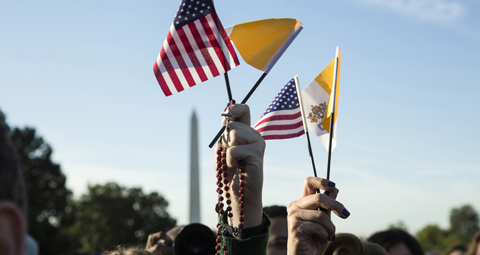March 16 | ![]() 0 COMMENTS
0 COMMENTS ![]() print
print

Beware when politicians fly the flag for the Faith
In his Letter from America, BRANDON MCGINLEY argues that only authentic belief in action will help stem the tide of Church-leavers
We are living in an age of apostasy. In the United States, at least 80 per cent of young adults stop practising the Faith in the first years after Confirmation. My home diocese is undergoing a massive reorganisation that will end in the closure of dozens of parishes because there simply are no longer enough Catholics to justify our current infrastructure.
We would drive ourselves to madness if we tried to figure out how this all could have been avoided. Traditionalists will point to the Second Vatican Council; their foes will point to what they perceive to have been the insufficient implementation of that council.
But the fact is that, at least in Europe and her former outposts, we have been living for generations under social conditions and philosophical presuppositions that are powerfully corrosive to true Faith. There was no way the Church was going to pass through entirely unscathed.
Rather than squabbling about what might have been, then, let us ask: what are we doing right now that is contributing to the problem? And what can we do to staunch the haemorrhage? Let me relate a pair of stories from my hometown.
It was an open secret that my former congressman was a lecherous and abusive boss. But he came from a Catholic family, went to Catholic schools, and had an impeccable voting record on issues of life and family, and so he was discussed in conservative political circles as a faithful Catholic. He resigned from his seat in the legislature after it was revealed that he had urged his mistress to get an abortion.
Now there is an election to replace him, and the candidate from the opposing party represents himself as a Catholic. He touts his diploma from a prominent Catholic high school and attends Mass. When a magazine reporter asked him if he would vote for federal legislation banning abortion after 20 weeks of gestation—most American states’ limits on infanticide range from 24 weeks to birth—he responded in the negative: “We [Catholics] believe that life begins at conception, but as a matter of separation of Church and state, I think a woman has the right to choose under the law.”
The Church has always had such scandalous figures, both among the clergy and the laity. And there has always been a temptation to ignore, to enable, or even to embrace the scandalous for some advantage, whether in ecclesial or civil politics. The most notorious example of this in recent decades has been the sex abuse crisis, which has significantly contributed to our age of apostasy.
Now that we are besieged on all sides by hostile secular authorities, this temptation is perhaps stronger than ever. In the case of figures like the congressman, we apply the word ‘Catholic’ to gravely morally compromised—but powerful—people in the hope that they might be able to strike a blow for the Church against those hostile authorities. And, in the case of figures like the candidate, we allow them to apply the word ‘Catholic’ to themselves, while turning a blind eye to their blatant corruptions of Church teaching, in the hope that they might affect a rapprochement between the Church and ascendant secularism.
But this always fails. The moral rot of our mercenaries is always found out—and even before it becomes public, it metastasises to those around them as cover-ups and compromises become habitual. And that rapprochement with secularism will never come to pass on acceptable terms.
Settling for such corrupted expressions of public Catholicism doesn’t just fail to advance the Church: it actively works against Her by reducing the Faith to something like a consumer brand, hollowing it out of anything transcendent and meaningfully true. It is also a species of despair, as it assumes that authentic Catholicism is simply not possible under modern conditions.
We have done the work of our political and cultural opponents for them by elevating a view of Catholic life that is at once cynical and malleable, accommodating itself to temporal power seemingly willy-nilly.
Why, then, should we be surprised that most young people—and many older people, for that matter—do not see the point in organising their lives around Jesus Christ and His Church?
This age of apostasy will not end until we say: “Enough. Enough compromising. Enough accommodation. Enough cynicism and fear. Our hope is in Christ. Let us follow Him. That is enough.”











